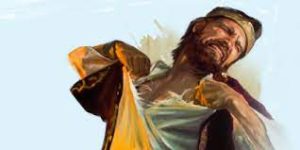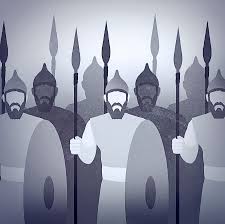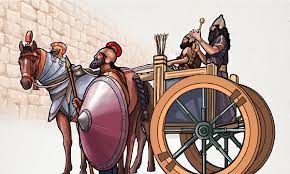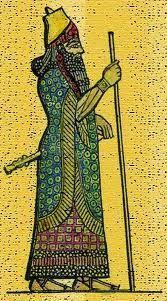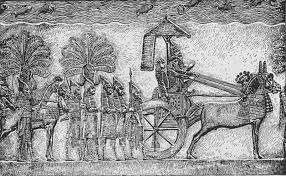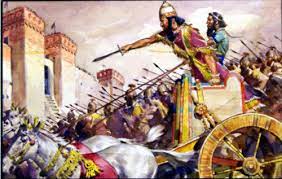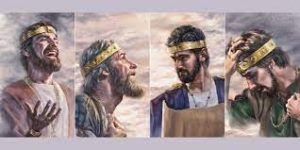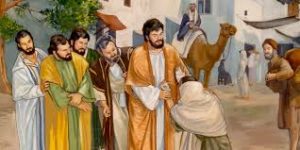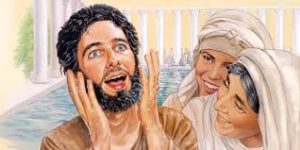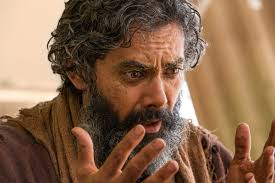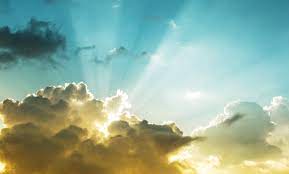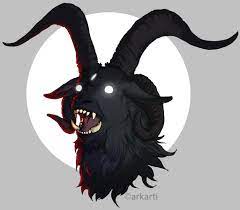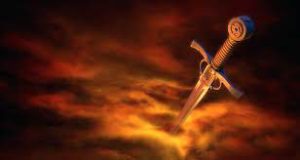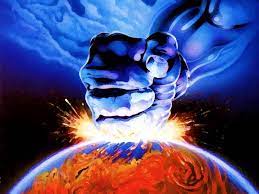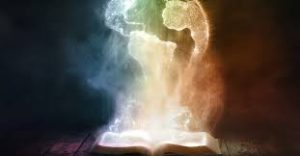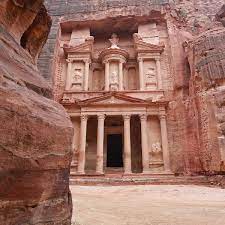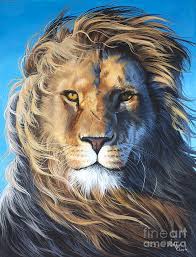Gu – Hezekiah Spread the Letter Before the LORD 37: 14-20
Hezekiah Spread the Letter Before the LORD
37: 14-20
Hezekiah spread the letter before the LORD DIG: On what basis does Hezekiah believe God will help him (see Second Chronicles 32:6-8)? How does Hezekiah’s prayer compare to what the LORD had called the leadership of Judah to do all along (see 1:15)? What truths about God does Hezekiah grasp? Why does he dwell on these? How is the point of his prayer like that of the Exodus (see Exodus 15:14-16)?
REFLECT: Hezekiah models how to respond to intimidation. What big threat to Christianity do you worry about? What might intimidate you about that, except for what Hezekiah models for you? What does this prayer have in common with that of the disciples in Acts 4:23-31? What do these prayers show you about God’s and Hezekiah’s characters? What do you see here about the proper focus of prayer?
Hezekiah, king of Judah, had received Sennacherib’s letter denouncing the LORD. This was a critical moment in the history of Isra’el. What will she do at this time, stripped of all her allies, face-to-face with the crushing realities of which the field commander had spoken? Will she agree with the Assyrian field commander that ADONAI is simply one more national god, helpless before Sennacherib? Or will she admit the foolishness of her ways and, for the first time in a very long time, commit herself to God alone? Had she sided with Sennacherib, all succeeding human history would have been very different. For Judah’s unconquerable faith that the LORD was unique, was the necessary ground for the coming of the Messiah. In fact, that challenge was what made all the difference. It was like a slap in the face. It was as if Judah said, “Thanks, I needed that.” She finally realized what Isaiah had been saying all along: No one can be trusted but God!
When Hezekiah received the letter from Sennacherib he read it (37:14a). Repentance was in order; not only repentance, but also responsibility. City after city had fallen to Sennacherib and long lines of refugees were already snaking their bitter way to exile – and it was all Hezekiah’s fault. As king, Hezekiah was responsible for leading the people down the wrong path of rebellion with the lunatic alliance with Egypt. But he doesn’t blame anyone else. Rather, it is he who must go to the Temple and admit the foolishness of his and the nation’s dependence on Egypt. Whereas Ahaz had refused to even ask for a sign of God’s help, Hezekiah finally realizes that ADONAI is his only hope. At the end of his rope, he resorts to prayer. It has finally come to that! So this was a defining moment for Hezekiah and for the nation.
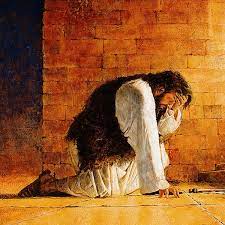
Then Hezekiah went up to the Temple of ADONAI. In a crisis, people are normally driven away from God or driven to Him. They either look to the world for answers, or they are driven even deeper into the LORD’s embrace. Hezekiah, wisely, chooses the latter. Hezekiah spread it out before ADONAI as a symbolic act, displaying the Assyrian’s blasphemies in the presence of God (37:14b). As with the Maccabees, who spread a copy of the defaced Torah before ADONAI (First Maccabees 3:48), this was not an attempt to inform God of something He did not already know, but an expression of outrage. He places it before the LORD as if to say, “Surely this cannot go unanswered.”
This was perhaps Hezekiah’s finest hour. He was not perfect. In fact, the mess he was in was largely of his own making. But in the last analysis, he knew that the LORD reigned, and therefore nothing was impossible or hopeless.133 Then Hezekiah offered a magnificent prayer, proclaiming the basis on which his plea for deliverance was made. How feeble it makes our own prayers seem by comparison. His prayer was not based on the circumstances in which he found himself. No, it is solely based on the character of ADONAI. The king was not asking that Sennacherib be defeated because Judah was so righteous. Obviously, it was not. Rather, it was because the Assyrians had called God’s name and reality into question. This is how it should be for us. When it is ADONAI’s reputation that matters most to us, we are free from the crippling self-concern that will otherwise eat us up. That is what we see in Hezekiah’s prayer. Here was a man whose personal success and survival are no long the number one thing in his life. This was a free man.
And Hezekiah prayed, “ADONAI-Tzva’ot, God of Isra’el, enthroned between the cherubim, you alone are YHVH over all the kingdoms of the earth. You have made heaven and earth. Give ear, God, and hear; open your eyes, O LORD, and see; listen to all the words Sennacherib has sent to insult the living God” (37:15).
Hezekiah’s prayer begins and ends with ADONAI. Referring to Him as the God of Isra’el, he recalled the special relationship that the Jews had with ADONAI. Then Hezekiah identifies the LORD in two most important ways: as King and Creator. First, God’s being enthroned between the cherubim refers to His presence in the Most Holy Place in the Temple (First Kings 8:10-13). God was above all because the cherubim were the highest order of created beings (Exodus 25:22; First Samuel 4:4; Psalm 80:1, 99:1). Secondly, he said the LORD is the Creator over all the kingdoms of the earth. Hezekiah prayed that God would both hear and see the words of Sennacherib and the defiance to the Living God.
It is true, O LORD that the Assyrian kings have laid waste all these peoples and their lands. They have thrown their gods into the fire and destroyed them, for they were not god but only wood and stone, fashioned by human hands. Now, therefore, ADONAI our God, deliver us from his hand, so that all the kingdoms on earth may know that you alone, ADONAI, are God (37:16-20).
He admitted some truth in Sennacherib’s boastings. Assyria had laid waste to all these peoples and their lands. Assyria had burned up their gods. But their gods were useless because of what they were, only wood and stone, fashioned by human hands. As he concluded his prayer, he asked for deliverance. He asked God to save Judah on the basis of who He is. If only we could learn to pray like this, what a difference it would make!



